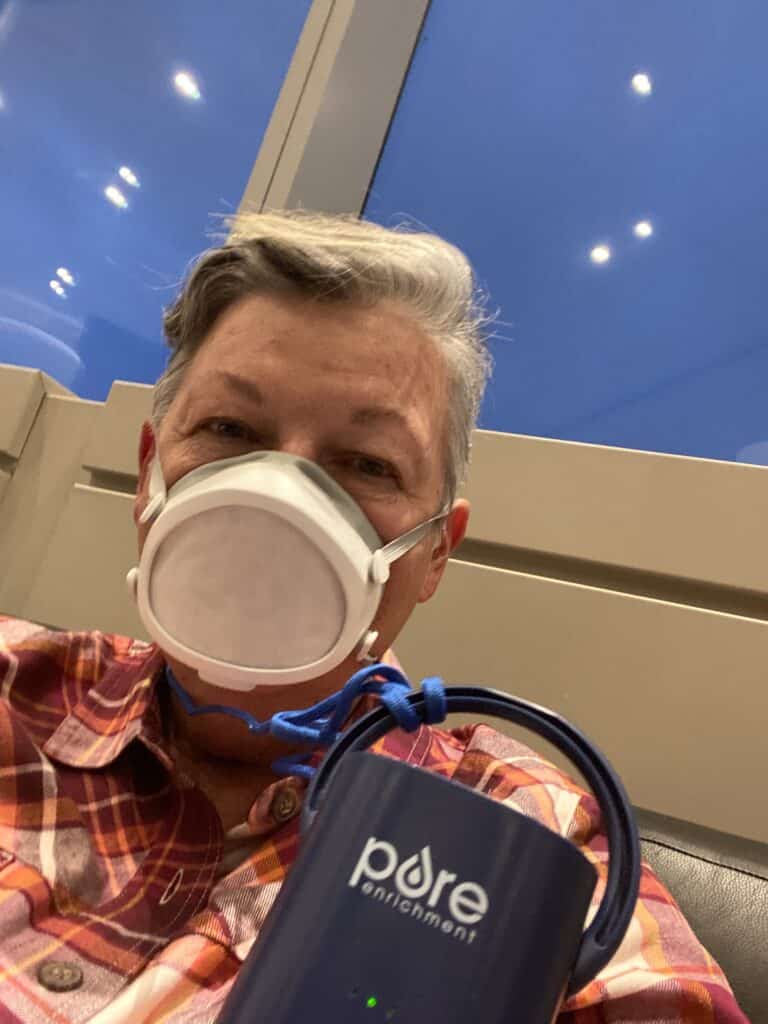
British Columbia, the province in which I live, has just issued fire-zone travel bans in response to unprecedented wildfires. Evacuations are underway. Non-emergency vehicles are not needed on the roads while people try to escape to somewhere else.
I wonder: how long will any of us be travelling anymore?
I am disinclined to fly anywhere anymore. At least not for pleasure. (But seriously, the pleasure of flying ended a long time ago. Cramped, uncomfortable seats, intolerable security lines, unexplained delays, and so much more have made flying an experience to get through rather than one to enjoy.) For me, the end of masking made flying dangerous to my health. It’s a grand opportunity to catch SARS-CoV-2. A recent study found over 80% of US flights had Omicron RNA in the wastewater, and the number of people coughing or otherwise visibly ill on the two flights I have taken since the start of the pandemic easily convinced me that flying is a bad idea for me unless absolutely necessary.
I took those two flights wearing a respirator and carrying a personal air purifier.

By 2019 standards, I looked ridiculous. By pandemic standards, I look just fine, at least to me. (Although I also look disastrously tired in this photo. It had been a long and difficult trip. And I can tell you, people stared.)
But what has really landed me in my own personal no-fly zone is the climate crisis. One of the half dozen or so truly impactful things I can do to reduce greenhouse gas emissions is to stop flying, or at least stop flying except when absolutely necessary.
What constitutes absolutely necessary? For me, the two air travel trips I have taken since the start of the pandemic were to prevent looming family crises. The thing is, we’ve come of age at a time when it is typical to live far away from family, and I do. Air travel made it possible to live like this and still be involved. Sometimes, I will have to travel by air if we want to be in touch on vital family matters. For me, I have decided this is necessary.
If I’m going, if I’m going to burn up all that carbon, I’ll make the absolute most of it. I combined the first trip with a book tour. To be clear, I would not have taken the book tour to Toronto if there also hadn’t been important family matters to attend to.
A vacation with air travel is a whole other thing. I can’t justify it anymore.
This summer, my partner and I drove our hybrid vehicle on our vacation as we camped and visited friends. Nothing is perfect, you know? Driving is better than flying. But it’s not great. There’s no holier than thou going on here. (One of my new favourite expressions is ”granolier than thou.”) I am by no means the person who lives an exemplary life. Like all of us, I’m struggling to learn how to live in our new pandemicene era. I’m just sharing one of my own personal decisions, a judgement I made for myself—not for others.
It’s a privilege to travel in so many ways, one which I acknowledge and am grateful to have had. I am giving up a privilege. I’m not giving up clean water. But it’s also not like giving up turnips, which I do not like. That would be easy to do. I’m giving up possibility. I’m giving up something with positive associations. It’s been a long journey to first recognize and then deal with the new negative associations. And the airline industry hasn’t helped. I would get daily offers from Air Canada and Aeroplan in my inbox. I finally unsubscribed.
And what about driving? Some of the areas of BC that we travelled through by car this summer are now, just a few weeks later, ablaze. Our road trip did not help. I’m grappling with that. Earlier this summer, I read a news story about planes full of tourists continuing to land in Greece even though the country was in a state of emergency because of wildfires. A sister of a friend is flying to Maui in September. It just feels bad to me. It feels bad for me. It is not something I would do. Again, I make that judgement for myself. I’m not saying no one should ever go to Maui or Greece again. They depend on tourism. Or at least they have until now.
Now it seems they need their resources for themselves. Last November, we drove through the region where Lytton is, and there were signs asking people not to visit. Of course, we did not go there. I get it. No one needs a bunch of lookie-loos. People need to grieve, to regroup, to kick the ashes. And they don’t need me trying to buy a sandwich while they do it.
So, for now, rather than travelling in troubling times, I’ll be staying close to home. I’ll be revelling in the joys of the here and now, in the small pleasures of my glorious neighbourhood. That’s not anything to be upset about.


